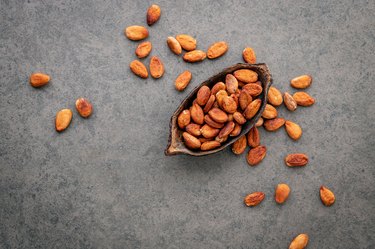
There are few worries about eating too many nuts because they are actually surprisingly delicious. To avoid weight gain, eat the recommended serving size, and use them to replace less-healthy foods.
Nuts have impressive wellness benefits due to their significant omega-3 fatty acids and mono- and polyunsaturated fat content, notes Harvard Health. They improve cholesterol, reduce blood clotting, prevent heart rhythm disorders, relax blood vessels and help curb the appetite. Seeds are equally nutritious.
Video of the Day
Video of the Day
Tip
The main adverse effect of overeating nuts is the possibility of weight gain. Don't eat too many Brazil nuts because their high selenium content may give you a toxic dose of the mineral.
Do Nuts Cause Weight Gain?
The only downside of eating too-many nuts is the possibility of weight gain, although some research disputes this effect. The Harvard T.H. Chan School of Public Health writes that an ounce of nuts contains 185 calories, which may lead to weight gain if you eat them regularly.
For this reason, instead of adding them to your current diet, you should substitute them for less-healthy snacks, such as chips, or use them in place of meat in main dishes.
A July 2014 study published in the American Journal of Clinical Nutrition addressed the concern that eating this high-fat, calorie-dense food leads to weight gain. The findings showed that rather than increasing the risk of obesity, nuts might actually decrease the risk.
Because nuts are high in fiber, they're associated with satisfying the appetite. The American Journal of Clinical Nutrition found several unexpected associations. Some analyses showed an inverse relationship between higher nut consumption and lower body weight.
In addition, a few studies reviewed in the American Journal of Clinical Nutrition showed that increasing nut consumption was tied to decreased weight gain over extended periods of time. The authors concluded that eating a handful of nuts regularly, as a replacement for less-healthy foods, can help prevent obesity.
Eating Too Many Nuts Concerns
Other concerns regarding nuts may involve whether they cause gas or stomach pain or whether they can be a part of the keto diet. As long as you eat the recommended amount of nuts, gas shouldn't be much of a problem, nor should nuts be excluded from the keto diet. The only nut variety that should be eaten in very limited amounts is the Brazil nut, because of its high selenium content.
The University of Michigan categorizes nuts as foods that produce a normal amount of gas. They contain fiber, a food constituent associated with gas. Fiber is essential for normal bowel movements; don't avoid it.
If you normally don't get much fiber in your diet, introducing high-fiber foods in your eating plan may initially produce gas; but this should improve in time. It may also help to eat more slowly, to help avoid swallowing too much air.
Nuts contain protein and healthy fat, but they also contain some carbohydrates, so those on the keto diet may wonder if the food can be a part of the eating plan. Harvard Health states that nuts are very low in carbohydrates, so they're featured in low-carb diets.
With this in mind, keto-diet followers shouldn't be reluctant to eat a daily serving of nuts. Just check with your doctor before going on the keto diet, because it's linked to dangerous side effects, warns a September 2018 study published in the Indian Journal of Medical Research.
Brazil nuts are very high in selenium, so if you eat too many, you can ingest more than the recommended amount of that mineral, warns the National Institutes of Health. Getting too much selenium results in side effects, and very high levels can cause serious problems. Don't eat more than four Brazil nuts per day.
Recommended Serving Size of Nuts
The nutrient profile of nuts differs, so eat a variety. For anyone wanting to know what the healthiest nuts are, it doesn't matter what kind you eat because they're all good for you, according to the Mayo Clinic. Peanuts are actually a legume and not a nut, but they are relatively healthy as well.
A daily serving of nuts is 1.5 ounces, which is a small handful of whole nuts or 2 tablespoons of a nut butter, says the Mayo Clinic.
To give you an idea of how many nuts to eat per day, the Cleveland Clinic provides the approximate number in an ounce for different types of nuts:
- 18 medium cashews
- 24 almonds
- 14 English walnut halves
- 15 pecan halves
- 12 hazelnuts
- 12 macadamia nuts
- 35 peanuts
When you buy nuts in bulk, it's a good idea to divide them into single-serving-size portions to avoid eating too many at once.
- Harvard T.H. Chan School of Public Health: "Nuts for the Heart"
- American Journal of Clinical Nutrition: "Long-Term Associations of Nut Consumption With Body Weight and Obesity"
- University of Michigan: "Helpful Hints for Controlling Gas"
- Harvard Health Publishing: "Nuts — A Healthy Treat"
- National Institute of Health: "Selenium"
- Mayo Clinic: "Nuts and Your Heart: Eating Nuts for Heart Health"
- Cleveland Clinic: "Nutrition: Nuts & Heart Health"
- Harvard Health Publishing: "Why Nutritionists Are Crazy About Nuts"
- Indian Journal of Medical Research: "Ketogenic Diets: Boon or Bane?"